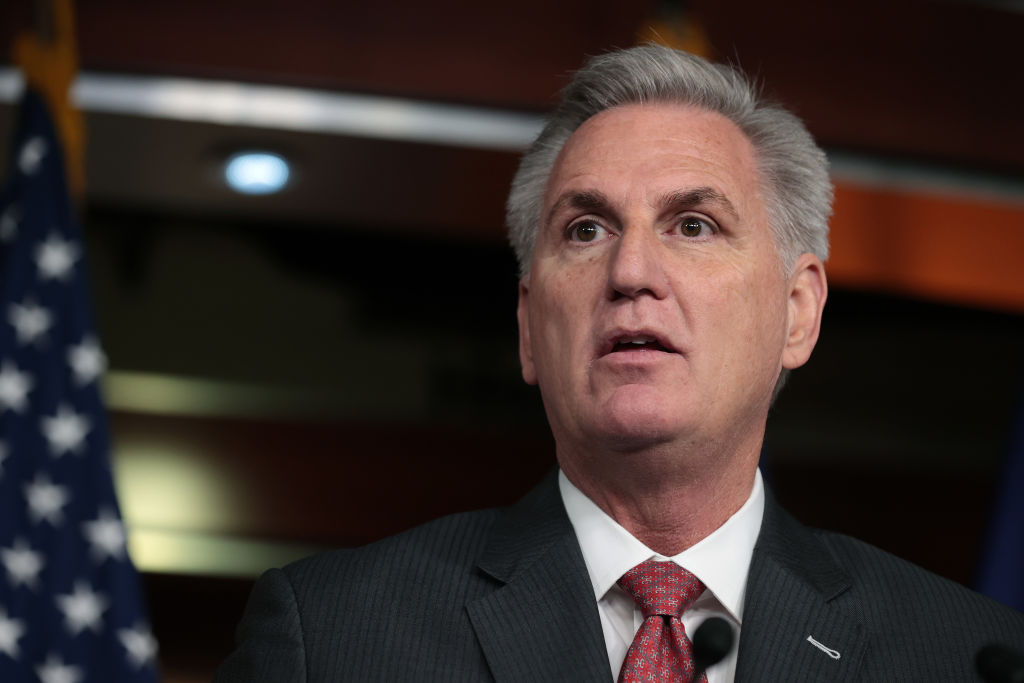Last week, with fewer than 50 days to go before the midterm elections, House Minority Leader Kevin McCarthy put it bluntly: elect Republicans to save what’s good about America. McCarthy introduced the Commitment to America, a policy plan he insists will put the country back on the right track.
In doing so, McCarthy was looking to former speaker of the House Newt Gingrich, hoping to recreate the magic of the 1994 Contract with America, which crystallized America’s then-conservative movement.
The Contract with America has a mythical quality in the minds of most pundits. It’s often credited as the reason behind the Republican Revolution of 1994, which saw Republicans gain control of both houses of Congress for the first time since 1953. Those wins effectively kneecapped President Clinton, who never again enjoyed a Democratic majority in either house while he was in the White House. Yet despite its fame today, Gingrich’s Contract was introduced only six weeks before Election Day.
Historians differ on the actual influence that the Contract with America had, given its short lead time. But maybe that’s good news for McCarthy. His Commitment feels like a Hail Mary pass. It’s the first new party platform in half a decade. You’ll recall that the RNC declined to update the Republican Party platform in 2020, choosing instead to say that it supported President Trump’s America First agenda and reissue the party platform from 2016. (That included a vestigial condemnation of the “current president,” which was originally aimed at Barack Obama but now referred to Donald Trump!)
There’s something about the Commitment that’s less satisfying than the original. After all, commitments are less binding than contracts. Electoral forecasters have revised their predictions for a red wave in 2022. The combination of candidate quality, the recent Supreme Court ruling on abortion, the shadow cast by Trump, and the multiple investigations into Trump’s handling of government documents and role in the January 6 attack on Congress have all dimmed expectations. What was supposed to be a Red Tsumami is now regarded as a Red Tidal Change.
Recall, too, that in 1994, then-House minority whip Gingrich received much public ridicule for daring to dream of a Republican majority. It had been sixty-plus years since Republicans controlled Congress. Unlike this year, most voters had no memory of what the country looked like with Republicans in charge of the legislative branch. Yet Gingrich was able to shrewdly capitalize on this seeming disadvantage: if you’re dissatisfied with the country, blame the party that’s been in power for generations. Whereas today, it’s unlikely Americans have forgotten how Republicans handle their time in government.
Then there’s the meat of the proposals. Gingrich’s three-page Contract included an eight-point plan to restore Americans’ trust in Congress. It promised to hold votes on 10 specific bills within the first 100 days. The list of bills covered “60 percent issues” like a constitutional amendment on term limits, a balanced budget amendment, tort reform, tough-on-crime legislation, child tax credits, welfare reform, and changes to national security policy. Divisive hot-button issues of the time, like prayer in school, gun rights, and homosexuality, were conspicuously absent from the Contract.
McCarthy’s effort, by contrast, is a one-pager of bullet points that seem intentionally vague. The “what” is fairly attractive: a thriving economy, reliable national security, an emphasis on freedoms, and government accountability. The “how” is anyone’s guess. Even then, look under the hood of the one-pager’s headers and you’ll find highly divisive national issues just below.
Under “national security” is a promise to secure the border — but nothing about fixing the dysfunctional legal immigration system that’s incentivized illegal border crossings. Under “freedoms” are allusions to ongoing fights at schools, including the inclusion of transgender student athletes and parental rights. Big Tech gets a shout-out under “freedom,” a bold move since some Republicans haven’t been shy about wanting to treat social media companies as public utilities and impose their own content moderation policies. “Government accountability” means election integrity reforms that have been used as a fig leaf to call into question the results of the 2020 election.
For such a supposedly forward-looking campaign, grievance politics are woven deep into the Commitment. It can’t be easy to unify such a fractious party, but the nuggets of MAGA politics undermine the leader’s goals: to focus on Republicans’ positive policy contributions that can put Democrats on the defensive. Note that McCarthy is sharing the stage with Gingrich rather than Donald Trump. And yet, as a shadow of his former self, there’s not much more Gingrich can do to help his protégé.
The Commitment was also plagued by a botched rollout. Quotes misattributed to Lincoln and Eastern European stock footage in the all-American marketing materials have overshadowed whatever policies there are. There are even multiple versions of the Commitment floating around the internet. CNN’s Nicole Hemmer linked to a version (labeled “final”) that has Republicans committing to developing a Covid vaccine. McCarthy’s website directs readers to a different PDF (labeled “v.4”) with no mention of the virus or vaccines.
Assuming that Republicans succeed in taking the House, McCarthy faces a tight election within his own party to obtain the speakership. You can be sure that rolling out the Commitment has helped him win friends and influence people in his caucus. And the corresponding materials in Spanish are a nice touch. But overall the Commitment feels like a Hail Mary pass. It may not be enough to avoid the biggest political upset in recent midterms history — and spoil McCarthy’s chances of wielding the gavel.


















